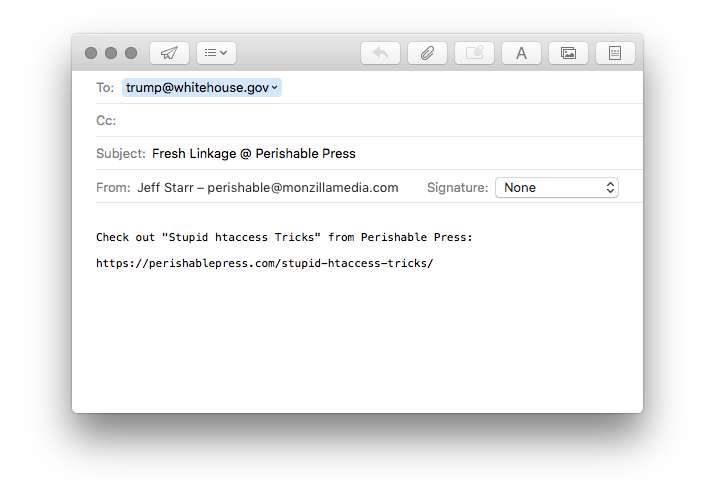The shared server on which I host Perishable Press was recently scanned by security software that revealed a significant security risk. Namely, the HTTP request methods TRACE and TRACK were found to be enabled on my webserver. The TRACE and TRACK protocols are HTTP methods used in the debugging of webserver connections. Although these methods are useful for legitimate purposes, they may compromise the security of your server by enabling cross-site scripting attacks (XST). By exploiting certain browser vulnerabilities, an […] Continue reading »
There are several ways to instruct Google to stay away from various pages in your site: Robots.txt directives Nofollow attributes on links Meta noindex/nofollow directives X-Robots noindex/nofollow directives ..and so on. These directives all function in different ways, but they all serve the same basic purpose: control how Google crawls the various pages on your site. For example, you can use meta noindex to instruct Google not to index your sitemap, RSS feed, or any other page you wish. This […] Continue reading »
Behold the ubiquitous list elements, <ul></ul> and <ol></ol>! These two sexy elements help millions of websites display lists of information in clean, semantic fashion. Without them, we’d be crawling around like filthy cavemen, eating dirt and howling at the moon. But these list elements aren’t just sexy, they are also extremely flexible, enabling us humble designers to create robust list configurations that are semantically versatile and highly customizable. We all know how to throw down a basic list: Continue reading »
When developing the colorful Quintessential Theme (opens in new tab), I initially planned on displaying five random posts from each of my most popular tags and categories in the super-slick sliding-panel sidebar. Because I am running an older version of WordPress, however, this task proved to be quite the educational experience. In newer versions (from 2.5 I think) of WordPress, the query_posts() function enables users to display posts in random order using the orderby=rand parameter. This would have made my […] Continue reading »
Recently a reader asked about how to password-protect a directory for every specified IP while allowing open access to everyone else. In my article, Stupid htaccess Tricks, I show how to password-protect a directory for every IP except the one specified, but not for the reverse case. In this article, I will demonstrate this technique along with a wide variety of other useful password-protection tricks, including a few from my Stupid htaccess Tricks article. Before getting into the juicy stuff, […] Continue reading »
![[ Dynamic Flow ]](https://perishablepress.com/wp/wp-content/images/2009/misc-chunks/dynamic-linkage.jpg)
In my recent guest post at The Nexus, I discuss Google’s new nofollow policy and suggest several ways to deal with it. In that article, I explain how Google allegedly has changed the way it deals with nofollow links. Instead of transferring leftover nofollow juice to remaining dofollow links as they always have, Google now pours all that wonderful nofollow juice right down the drain. This shift in policy comes as a terrible surprise to many webmasters and SEO gurus, […] Continue reading »
Anyone plugged into the Web these days has heard about how Google has supposedly changed the way it deals with nofollow attributes. According to a number of speculative reports, Google will no longer apply unused nofollow PageRank to other links on the page. So, let’s say that you have some sites that have been PageRank “sculpted” by way of strategically applied nofollow tags. For example, you may have nofollowed all of your comment, footer, or sidebar links. Ever since Google […] Continue reading »
![[ Screenshot: The Legion of Doom ]](https://perishablepress.com/wp/wp-content/images/2009/misc-chunks/multiple-addresses.jpg)
Let’s face it. There’s just as much scum on the Internet as there is out there in the “real world.” Maybe even more, who knows. From scammers and spammers to scrapers and crackers, the Web is just crawling with all sorts of pathetic scumbags. As predictably random as much of the malicious activity happens to be, it is virtually guaranteed that you will be hounded by at least a few persistent IP addresses that, for whatever reason, have latched on […] Continue reading »
Normally, when visitors post a comment to your site, specific types of client data are associated with the request. Commonly, a client will provide a user agent, a referrer, and a host header. When any of these variables is absent, there is good reason to suspect foul play. For example, virtually all browsers provide some sort of user-agent name to identify themselves. Conversely, malicious scripts directly posting spam and other payloads to your site frequently operate without specifying a user […] Continue reading »
When designing sites, it is often useful to identify different pages by adding an ID attribute to the <body></body> element. Commonly, the name of the page is used as the attribute value, for example: <body id="about"></body> In this case, “about” would be the body ID for the “About” page, which would be named something like “about.php”. Likewise, other pages would have unique IDs as well, for example: <body id="archive"> </body><body id="contact"> </body><body id="subscribe"> </body><body id="portfolio"></body> ..again, with each ID associated […] Continue reading »
Just like last year, this Spring I have been taking some time to do some general maintenance here at Perishable Press. This includes everything from fixing broken links and resolving errors to optimizing scripts and eliminating unnecessary plugins. I’ll admit, this type of work is often quite dull, however I always enjoy the process of cleaning up my HTAccess files. In this post, I share some of the changes made to my HTAccess files and explain the reasoning behind each […] Continue reading »
![Error establishing a database connection [ Screenshot: WP Default Database Error Page ]](https://perishablepress.com/wp/wp-content/images/2009/install-security/h4x0rd_03.gif)
The other day, my server crashed and Perishable Press was unable to connect to the MySQL database. Normally, when WordPress encounters a database error, it delivers a specific error message similar to the following: Continue reading »
Given my propensity to discuss matters involving error log data (e.g., monitoring malicious behavior, setting up error logs, and creating extensive blacklists), I am often asked about the best way to go about monitoring 404 and other types of server errors. While I consider myself to be a novice in this arena (there are far brighter people with much greater experience), I do spend a lot of time digging through log entries and analyzing data. So, when asked recently about […] Continue reading »
Importing and displaying external RSS feeds on your site is a great way to share your online activity with your visitors. If you are active on Flickr, Delicious, Twitter, or Tumblr, your visitors will enjoy staying current with your updates. Many social media sites provide exclusive feeds for user-generated content that may be imported and displayed on virtually any web page. In this article, you will learn three ways to import and display feed content on your WordPress-powered website — […] Continue reading »
You have seen user-agent blacklists, IP blacklists, 4G Blacklists, and everything in between. Now, in this article, for your sheer and utter amusement, I present a collection of over 8000 blacklisted referrers. Shortcut: skip the article and jump to Disclaimer and Download » Referrer Spam Sucks For the uninitiated, in teh language of teh Web, a referrer is the online resource from whence a visitor happened to arrive at your site. For example, if Johnny the Wonder Parrot was visiting the […] Continue reading »

In addition to your choice collection of “Share This” links, you may also want to provide visitors with a link that enables them to quickly and easily send the URL permalink of any post to their friends via email. This is a great way to increase your readership and further your influence. Just copy & paste the following code into the desired location in your page template: <a href="mailto:?subject=Fresh%20Linkage%20@%20Perishable%20Press&body=Check%20out%20<?php the_permalink(); ?>%20from%20Perishable%20Press" title="Send a link to this post via email" rel="nofollow">Share […] Continue reading »

![[ Dynamic Flow ]](https://perishablepress.com/wp/wp-content/images/2009/misc-chunks/dynamic-linkage.jpg)
![[ Screenshot: The Legion of Doom ]](https://perishablepress.com/wp/wp-content/images/2009/misc-chunks/multiple-addresses.jpg)
![Error establishing a database connection [ Screenshot: WP Default Database Error Page ]](https://perishablepress.com/wp/wp-content/images/2009/install-security/h4x0rd_03.gif)

